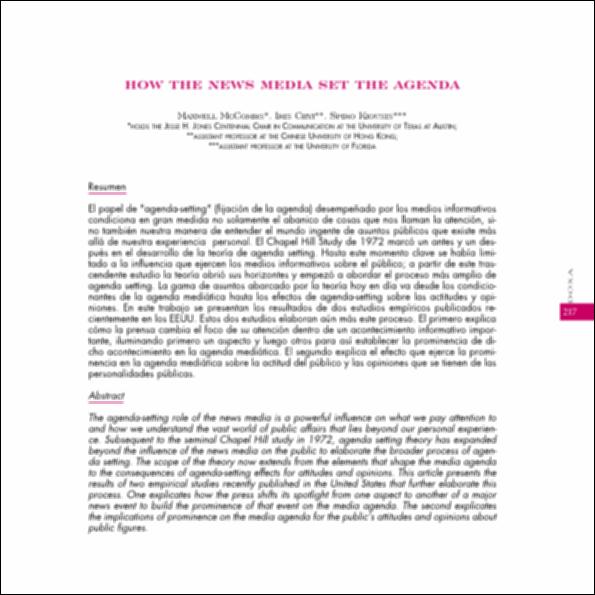Please use this identifier to cite or link to this item:
http://hdl.handle.net/10637/6011How the news media set the agenda
| Title: | How the news media set the agenda |
| Authors : | McCombs, Maxwell Kiousis, Spiro Chyi, Iris |
| Keywords: | Planificación política; Opinión pública |
| Abstract: | El papel de "agenda-setting" (fijación de la agenda) desempeñado por los medios informativos condiciona en gran medida no solamente el abanico de cosas que nos llaman la atención, sino también nuestra manera de entender el mundo ingente de asuntos públicos que existe más allá de nuestra experiencia personal. El Chapel Hill Study de 1972 marcó un antes y un después en el desarrollo de la teoría de agenda setting. Hasta este momento clave se había limitado a la influencia que ejercen los medios informativos sobre el público; a partir de este trascendente estudio la teoría abrió sus horizontes y empezó a abordar el proceso más amplio de agenda setting. La gama de asuntos abarcado por la teoría hoy en día va desde los condicionantes de la agenda mediática hasta los efectos de agenda-setting sobre las actitudes y opiniones. En este trabajo se presentan los resultados de dos estudios empíricos publicados recientemente en los EEUU. Estos dos estudios elaboran aún más este proceso. El primero explica cómo la prensa cambia el foco de su atención dentro de un acontecimiento informativo importante, iluminando primero un aspecto y luego otros para así establecer la prominencia de dicho acontecimiento en la agenda mediática. El segundo explica el efecto que ejerce la prominencia en la agenda mediática sobre la actitud del público y las opiniones que se tienen de las personalidades públicas. The agenda-setting role of the news media is a powerful influence on what we pay attention to and how we understand the vast world of public affairs that lies beyond our personal experience. Subsequent to the seminal Chapel Hill study in 1972, agenda setting theory has expanded beyond the influence of the news media on the public to elaborate the broader process of agenda setting. The scope of the theory now extends from the elements that shape the media agenda to the consequences of agenda-setting effects for attitudes and opinions. This article presents the results of two empirical studies recently published in the United States that further elaborate this process. One explicates how the press shifts its spotlight from one aspect to another of a major news event to build the prominence of that event on the media agenda. The second explicates the implications of prominence on the media agenda for the public’s attitudes and opinions about public figures. |
| Description: | En: Doxa Comunicación : revista interdisciplinar de estudios de comunicación y ciencias sociales. ISSN 1696-019X n. II, 2004, pp 217-223 |
| URI: | http://hdl.handle.net/10637/6011 |
| Rights : | https://creativecommons.org/licenses/by-nc/4.0/deed.es |
| Issue Date: | 1-Jun-2004 |
| Center : | Universidad San Pablo-CEU |
| Appears in Collections: | Doxa.Comunicación nº 002 (2004) |
Items in DSpace are protected by copyright, with all rights reserved, unless otherwise indicated.


